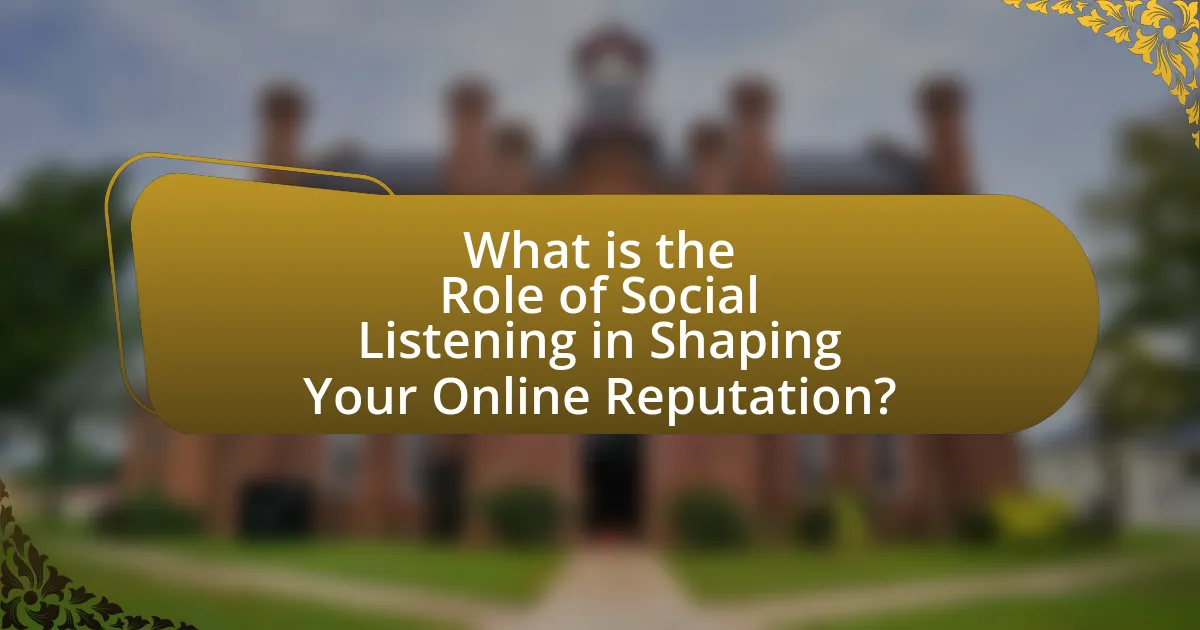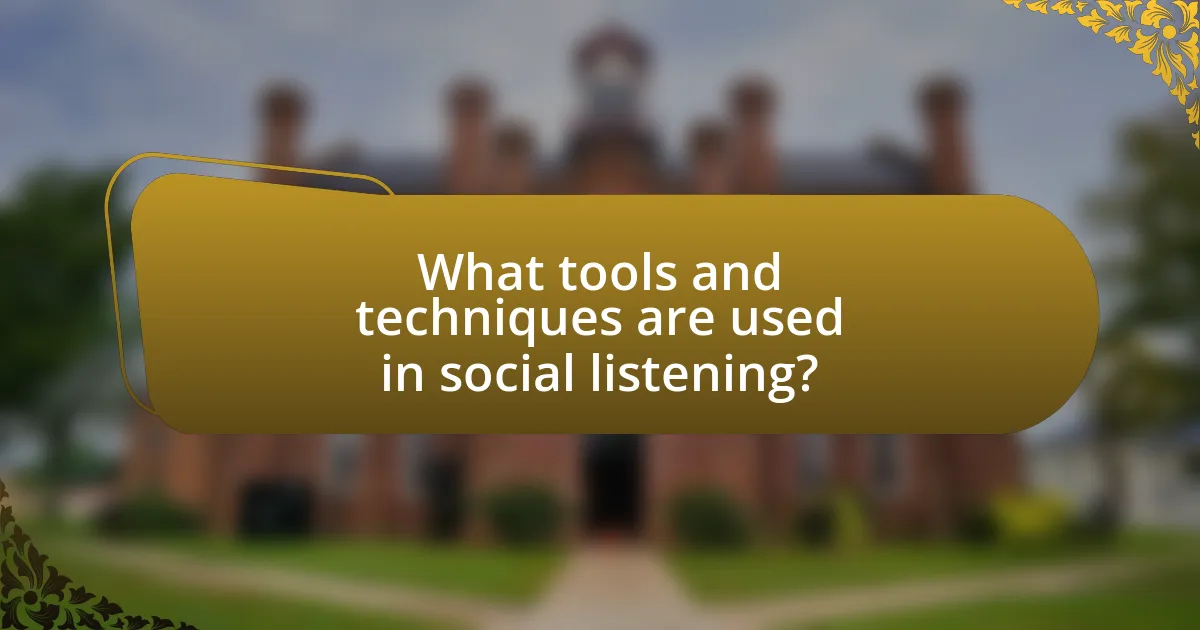The article focuses on the role of social listening in shaping online reputation for businesses. It emphasizes the importance of monitoring and analyzing brand conversations across digital platforms to gauge public sentiment, respond to customer feedback, and proactively address potential issues. Key elements of social listening include brand mention monitoring, sentiment analysis, audience engagement, and competitor tracking, which collectively enhance reputation management. The article also highlights the differences between social listening and traditional reputation management, the risks of neglecting social listening, and the practical benefits it offers for fostering customer relationships and improving brand loyalty.

What is the Role of Social Listening in Shaping Your Online Reputation?
Social listening plays a crucial role in shaping online reputation by enabling organizations to monitor and analyze conversations about their brand across various digital platforms. This practice allows businesses to identify public sentiment, respond to customer feedback, and address potential issues proactively. For instance, a study by Sprout Social found that 70% of consumers are more likely to recommend a brand that responds to their social media inquiries, highlighting the importance of engagement in reputation management. By leveraging social listening tools, companies can gain insights into customer preferences and perceptions, ultimately guiding their communication strategies and enhancing their overall reputation.
How does social listening impact online reputation management?
Social listening significantly impacts online reputation management by enabling organizations to monitor and analyze conversations about their brand across various digital platforms. This proactive approach allows businesses to identify potential issues, respond to customer feedback in real-time, and engage with their audience effectively. For instance, a study by Sprout Social found that 70% of consumers are more likely to recommend a brand that responds to their social media inquiries, highlighting the importance of timely engagement in shaping public perception. By leveraging social listening tools, companies can not only mitigate negative sentiments but also enhance their brand image through positive interactions, ultimately leading to improved customer loyalty and trust.
What are the key elements of social listening that influence reputation?
The key elements of social listening that influence reputation include monitoring brand mentions, analyzing sentiment, engaging with audiences, and tracking competitor activity. Monitoring brand mentions allows organizations to understand public perception and identify potential issues. Analyzing sentiment helps gauge the emotional tone of conversations, providing insights into how the brand is viewed. Engaging with audiences fosters relationships and demonstrates responsiveness, which can enhance reputation. Tracking competitor activity offers context for a brand’s standing in the market, enabling strategic adjustments. These elements collectively contribute to a comprehensive understanding of a brand’s reputation in the digital landscape.
How does social listening differ from traditional reputation management?
Social listening differs from traditional reputation management in that it focuses on real-time monitoring and analysis of online conversations about a brand, while traditional reputation management typically involves reactive measures to address existing issues. Social listening utilizes tools to track mentions across social media platforms, enabling brands to understand public sentiment and engage proactively, whereas traditional reputation management often relies on responding to reviews and media coverage after negative events occur. This proactive approach in social listening allows brands to identify trends and potential crises early, leading to more effective reputation strategies.
Why is social listening essential for businesses today?
Social listening is essential for businesses today because it enables them to monitor and analyze online conversations about their brand, competitors, and industry trends. This practice allows companies to gain insights into customer sentiment, preferences, and emerging issues, which can inform marketing strategies and product development. According to a report by Sprout Social, 70% of consumers are more likely to use a brand if they see it actively engaging with its audience on social media. By leveraging social listening, businesses can enhance their online reputation, respond proactively to customer feedback, and ultimately drive customer loyalty and sales.
What are the risks of neglecting social listening?
Neglecting social listening poses significant risks, including damage to brand reputation, loss of customer trust, and missed opportunities for engagement. When organizations fail to monitor social media conversations, they may overlook negative feedback or emerging trends, leading to unresolved customer issues that can escalate into public relations crises. For instance, a study by Sprout Social found that 70% of consumers are more likely to support brands that respond to their social media inquiries, highlighting the importance of active engagement. Additionally, neglecting social listening can result in a lack of awareness about competitors’ strategies, ultimately hindering a company’s ability to adapt and innovate in a rapidly changing market.
How can social listening enhance customer relationships?
Social listening enhances customer relationships by enabling businesses to understand customer sentiments and preferences in real-time. By monitoring social media platforms and online conversations, companies can identify customer needs, respond to inquiries promptly, and address concerns before they escalate. Research indicates that 70% of consumers feel more connected to brands that engage with them on social media, demonstrating that active listening fosters loyalty and trust. Additionally, social listening provides valuable insights into market trends, allowing businesses to tailor their offerings and communication strategies effectively, further strengthening customer relationships.

What tools and techniques are used in social listening?
Social listening employs various tools and techniques to monitor and analyze online conversations. Key tools include social media monitoring platforms like Hootsuite, Brandwatch, and Sprout Social, which aggregate data from multiple social channels. Techniques involve sentiment analysis, which assesses the emotional tone of conversations, and keyword tracking, which identifies specific terms or phrases relevant to a brand. Additionally, competitor analysis tools help organizations understand their market position by comparing social engagement metrics. These tools and techniques enable brands to gain insights into customer perceptions and improve their online reputation effectively.
How do social listening tools work?
Social listening tools work by monitoring and analyzing online conversations across various social media platforms and websites to gather insights about public sentiment and brand perception. These tools utilize algorithms to track keywords, hashtags, and mentions related to a brand or topic, allowing businesses to identify trends, customer feedback, and potential issues in real-time. For example, a study by Sprout Social found that 70% of consumers are more likely to recommend a brand that responds to their social media inquiries, highlighting the importance of timely engagement facilitated by social listening tools.
What features should you look for in social listening tools?
When selecting social listening tools, prioritize features such as real-time monitoring, sentiment analysis, and comprehensive reporting capabilities. Real-time monitoring allows businesses to track conversations as they happen, enabling timely responses to customer feedback or emerging trends. Sentiment analysis helps in understanding public perception by categorizing mentions as positive, negative, or neutral, which is crucial for reputation management. Comprehensive reporting capabilities provide insights into engagement metrics, audience demographics, and trend analysis, facilitating informed decision-making. These features collectively enhance a brand’s ability to manage its online reputation effectively.
How can analytics improve social listening efforts?
Analytics can significantly enhance social listening efforts by providing actionable insights derived from data patterns and trends. By analyzing social media conversations, brands can identify customer sentiment, preferences, and emerging topics, allowing them to tailor their strategies effectively. For instance, a study by Sprout Social found that 70% of consumers are more likely to engage with brands that respond to their social media posts, highlighting the importance of understanding audience feedback through analytics. This data-driven approach enables companies to proactively manage their online reputation and address potential issues before they escalate.
What techniques can enhance the effectiveness of social listening?
To enhance the effectiveness of social listening, organizations should implement techniques such as utilizing advanced analytics tools, engaging in sentiment analysis, and monitoring multiple platforms. Advanced analytics tools enable the processing of large volumes of data, allowing for the identification of trends and patterns in consumer behavior. Sentiment analysis helps in understanding public perception by categorizing emotions expressed in social media posts, which can inform strategic decisions. Monitoring multiple platforms ensures a comprehensive view of conversations, as different demographics may prefer different social media channels. These techniques collectively improve the ability to respond to consumer needs and manage online reputation effectively.
How can sentiment analysis be applied in social listening?
Sentiment analysis can be applied in social listening by systematically evaluating online conversations to gauge public opinion about a brand or topic. This process involves using natural language processing techniques to analyze text data from social media platforms, forums, and reviews, allowing organizations to identify positive, negative, or neutral sentiments expressed by users. For instance, a study by Liu (2012) highlights that sentiment analysis can enhance brand reputation management by providing insights into customer perceptions, enabling companies to respond proactively to negative feedback and reinforce positive interactions.
What role does engagement play in social listening strategies?
Engagement is crucial in social listening strategies as it directly influences the effectiveness of brand communication and customer relationship management. High levels of engagement indicate that audiences are actively participating in conversations, providing valuable insights into their preferences and sentiments. For instance, a study by Sprout Social found that brands that engage with their audience see a 20% increase in customer loyalty, demonstrating that responsive interaction enhances brand reputation and fosters trust. Thus, engagement not only enriches the data collected through social listening but also strengthens the overall impact of the strategy on a brand’s online reputation.

How can businesses implement social listening effectively?
Businesses can implement social listening effectively by utilizing advanced analytics tools to monitor online conversations about their brand. These tools allow companies to track mentions across various social media platforms, forums, and blogs, providing insights into customer sentiment and emerging trends. For instance, a study by Sprout Social found that 70% of consumers are more likely to recommend a brand that listens and responds to their feedback. By analyzing this data, businesses can identify key themes, address customer concerns promptly, and adapt their strategies to enhance their online reputation.
What steps should be taken to start a social listening strategy?
To start a social listening strategy, first define clear objectives that align with your brand’s goals, such as understanding customer sentiment or tracking brand mentions. Next, select appropriate social listening tools that can monitor relevant platforms and keywords effectively. After that, gather and analyze data to identify trends, insights, and areas for improvement. Finally, implement actionable strategies based on the insights gained, and continuously monitor and adjust your approach to enhance your online reputation. These steps are essential for effectively leveraging social listening to shape your brand’s presence and engagement online.
How can businesses identify key metrics for social listening?
Businesses can identify key metrics for social listening by analyzing engagement levels, sentiment analysis, and brand mentions across social media platforms. Engagement levels, such as likes, shares, and comments, provide insights into how audiences interact with content, indicating their interests and preferences. Sentiment analysis helps businesses gauge public perception by categorizing mentions as positive, negative, or neutral, which is crucial for understanding brand reputation. Additionally, tracking brand mentions allows businesses to measure awareness and identify trends or issues that may affect their online reputation. These metrics collectively enable businesses to make informed decisions and enhance their social listening strategies.
What are common pitfalls to avoid in social listening implementation?
Common pitfalls to avoid in social listening implementation include neglecting to define clear objectives, failing to choose the right tools, and not integrating insights into decision-making processes. Defining clear objectives ensures that social listening efforts align with business goals, while selecting appropriate tools is crucial for effectively capturing and analyzing relevant data. Additionally, integrating insights into decision-making processes is vital; without this, valuable information may go unused, leading to missed opportunities for reputation management. Research indicates that organizations that align social listening with strategic objectives see a 30% increase in customer engagement, highlighting the importance of these practices.
What best practices should businesses follow for effective social listening?
Businesses should implement the best practices of defining clear objectives, utilizing the right tools, engaging with audiences, and analyzing data for effective social listening. Defining clear objectives allows businesses to focus on specific goals, such as brand awareness or customer feedback, which enhances the relevance of the insights gathered. Utilizing the right tools, such as social media monitoring software, enables businesses to track mentions and sentiment across various platforms efficiently. Engaging with audiences by responding to comments and feedback fosters a positive relationship and demonstrates that the business values customer input. Analyzing data helps businesses identify trends and areas for improvement, leading to informed decision-making. According to a report by Sprout Social, 70% of consumers are more likely to recommend a brand that responds to their social media inquiries, highlighting the importance of engagement in social listening practices.
How can businesses ensure they are responsive to social feedback?
Businesses can ensure they are responsive to social feedback by implementing a robust social listening strategy that actively monitors and analyzes customer interactions across various platforms. This involves utilizing tools that track mentions, comments, and reviews in real-time, allowing businesses to quickly identify and address concerns or praise. For instance, a study by Sprout Social found that 70% of consumers are more likely to recommend a brand that responds to their feedback, highlighting the importance of timely engagement. By prioritizing responsiveness, businesses can enhance customer satisfaction and strengthen their online reputation.
What strategies can help in integrating social listening with overall marketing efforts?
Integrating social listening with overall marketing efforts can be effectively achieved through the implementation of targeted strategies such as aligning social listening insights with marketing objectives, utilizing data analytics for actionable insights, and fostering cross-departmental collaboration. Aligning social listening insights with marketing objectives ensures that the data collected directly informs campaign strategies, enhancing relevance and engagement. Utilizing data analytics allows marketers to interpret social listening data, identifying trends and consumer sentiments that can shape content and messaging. Furthermore, fostering cross-departmental collaboration between marketing, customer service, and product development teams ensures that insights from social listening are shared and acted upon, creating a cohesive brand strategy that resonates with the audience. These strategies collectively enhance the effectiveness of marketing efforts by ensuring they are informed by real-time consumer feedback and market trends.
What are the practical benefits of social listening for online reputation management?
Social listening provides practical benefits for online reputation management by enabling organizations to monitor and analyze conversations about their brand in real-time. This proactive approach allows businesses to identify potential issues before they escalate, respond to customer feedback promptly, and engage with their audience effectively. For instance, a study by Sprout Social found that 70% of consumers are more likely to recommend a brand that responds to their social media inquiries, highlighting the importance of timely engagement. Additionally, social listening helps brands understand public sentiment and trends, allowing them to tailor their messaging and strategies accordingly, which can enhance brand loyalty and trust.
How can social listening lead to proactive reputation management?
Social listening enables proactive reputation management by allowing organizations to monitor and analyze online conversations about their brand in real-time. This practice helps identify potential issues before they escalate, as companies can detect negative sentiments or emerging trends that may affect their reputation. For instance, a study by Sprout Social found that 70% of consumers are more likely to recommend a brand that responds to their social media inquiries, highlighting the importance of engagement in reputation management. By leveraging insights gained from social listening, brands can tailor their communication strategies, address customer concerns promptly, and foster positive relationships, ultimately enhancing their overall reputation.
What are the long-term advantages of maintaining a strong online reputation through social listening?
Maintaining a strong online reputation through social listening offers long-term advantages such as increased customer trust and loyalty. By actively monitoring and responding to customer feedback, businesses can demonstrate their commitment to customer satisfaction, which fosters a positive brand image. Research indicates that 77% of consumers are more likely to buy from a brand that responds to their reviews, highlighting the importance of engagement in building trust. Additionally, a strong online reputation can lead to improved search engine rankings, as positive reviews and interactions can enhance visibility. This visibility can result in higher conversion rates, as consumers are more inclined to choose brands with favorable online perceptions.

Leave a Reply